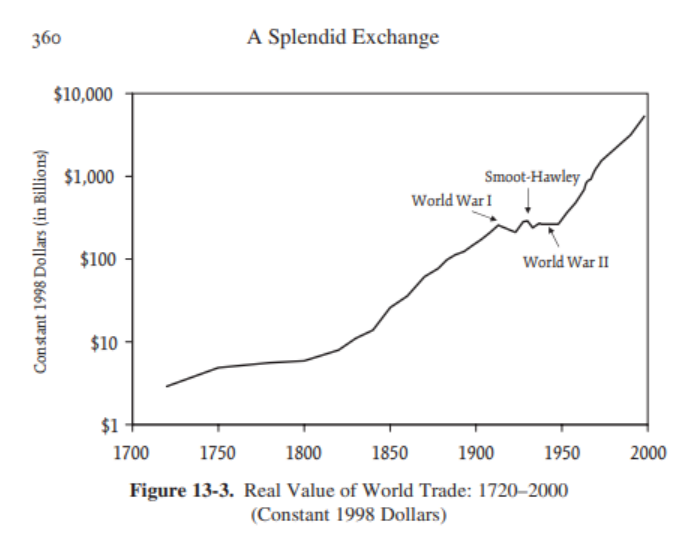Wide tariffs are a bad idea.
How can I know this?
History shows that they are not going well.
Let’s look back.
JP Morgan Michael Sembust I wrote about President McKinley’s tragic tariffs in the late 1800s:
President William McKinley’s tariffs were very popular when they were enacted, but they caused an almost immediate inflationary spike. The voters were very unhappy. A few months later, the GOP lost 100 seats in the midterm elections in 1890. The 1890 GOP loss is the third largest in the history of the House of Representatives returning to civil war.
It sounds great in theory, but not really that much.
I first learned about customs duties from Ferris Buhler’s holidays:
https://www.youtube.com/watch?v=yuohbyuanby
They didn’t work either.
Amazing exchange Written by William Bernstein is the best book on the benefits of free trade.1 This is a passage on Smoot Holy tariffs enacted in the 1930s.
For three years after Smoot Holy passed in 1930, French races, Spanish fruits, Canadian wood, Argentinean beef, Swiss watches and American cars slowly disappeared from the world’s w head. By 1933, the whole planet appeared to be heading towards what economists call Autarky. This is a condition for the country to achieve self-sufficiency in all products, and no matter how inappropriate they were, they were not producing them.
This was the result:
Between 1930 and 1933, global trade volume fell by half from a third. Depending on the method of measurement of the falloff, this was calculated to 3-5% of the global GDP, and these losses were partially composed of more expensive domestic commodities.
You can see the collapse of trade during this period of isolation.

Again, Great Repression played a major role, but was exacerbated by the trade war. Isolationism and protectionism were also blamed on World War II.
Trade has opened up in pursuit of World War II around the world. In 1929, Americans spent 24% of their income on food. It’s similar to 10% today. This is the advantage of free trade.
Obviously, the world is currently a different place than 1890 or 1929. In fact, I think that target tariffs in some countries like China make sense to protect certain US industries from economic rivals.
However, universal tariffs also cause unnecessary economic pain for businesses and consumers.
But does this take the manufacturing and work back to America?
no. Karen Roche explanation:
Manufacturing has fallen from 40% of US employment to 7% since 1950, and robotics will destroy the remaining 7% over the next 50 years. These jobs have not returned, and trying to bring the world’s most advanced technological economy back to an emerging market manufacturing economy is the opposite idea.
Americans have fewer options as the government reduces competition and consumer options. This will increase the price. Especially when US companies realize that they have more pricing power due to government manipulation of markets.
A sophisticated economy should not want to retreat. That makes no sense. Joe Weisenthal explanation:
One way to think about relatively open trading blocks is that by allowing more specialization and focus, the economy can build more complex market objects. If you want to have an Autorky in the US, you can probably do that, but build an advanced and complex industry with so many resources dedicated to kitchen mitts and microwave manufacturing.
Even if you agree to tariffs as a policy idea, implementation here is worse than the way the Mavericks traded Luka for the Lakers. In this way, we cannot expect businesses and small businesses around the world to change their supply chains and manufacturing capabilities on the fly. Can’t do it overnight.
It’s economic suicide.
Based on the number of White Houses, businesses pay 40%, 50%, or 60% or more in tariffs. Companies try to cut costs like crazy. This means there could be a lot of layoffs.
This is not sustainable.
The hope is that negotiations will occur and these fees will drop dramatically. Otherwise, the recession must be a baseline expectation in such a trade war.
The results here feel binary.
It’s not exactly the same scenario, but this situation reminds me of many stories Art Kashin What he learned from more experienced investors about navigating the Cuban missile crisis:
Professor Jack was already at the bar, so only people who are 19 or 20 can do it, so I burst the door. And I said, “Jack, Jack. The rumor is that there’s a missile flying.”
And he said, “Kid, sit down and buy me a drink.”
And I sat down and he said, “Listen carefully. If you hear missiles flying, buy them and they’re not selling them.”
And I looked at him and said, “You buy them, and you don’t sell them?”
He said, “Of course, if you’re wrong, the deal is never clear. We’re all dead.”
If Trump and the team maintain these incredibly high tariffs, we all die in the way we speak. It will ultimately turn the economy into its core.
The market is in a free fall, but it’s fine. The stock market has been worse than this in the past. Stock will be returned at some point.
I’m more concerned about the financial impact. If this continues, many people will be in a world of pain.
Michael and I talked about this week’s Animal Spirit Video about tariffs and more:
https://www.youtube.com/watch?v=l6ctyprfbve
Subscribe to Compounds So you won’t miss an episode.
Read more:
The effects of wealth
Here’s what I’ve been reading recently:
Book: Book:
1Here is Free chapters About tariffs and trade wars worth reading.







